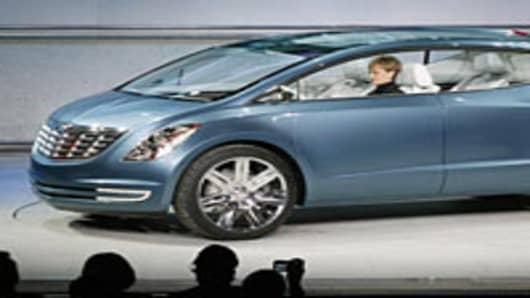Automakers are gearing up for mass-market production of hydrogen-powered cars starting in 2015, but the fuel cell technology has plenty of skeptics, including President Obama.
After being championed by former President George W. Bush as a pollution-free solution for weaning America off its dependence on foreign oil, the vehicles are in danger of losing research and development funding under the Obama administration, which argues that plug-in electric cars are a more practical bet.
However, major automakers and other proponents of hydrogen-fueled cars managed to thwart similar attempts to cut funding for programs for fuel-cell research in 2009 and hope to do so again.
Nevertheless, they're worried about the signal the Obama administration’s stance is sending to the marketplace and to investors about the vehicles, which create electric power from hydrogen and emit nothing but clean water from their tailpipes.
“We’re prepared to make thousands of these cars,” says Mike O’Brien, vice president of product planning at Hyundai Motor America. “But it really comes down to how many fuel stations there are at that point. It’s a chicken and egg story for us.”
Energy Secretary Steven Chu maintains that hydrogen fuel-cell vehicles need technological miracles too distant to warrant funding when electric cars are a far more promising near-term prospect to give American consumers an alternative to the roughly 230 million gas-guzzlers on the road.
Automakers, who have pumped billions of dollars into hydrogen technology, say Chu’s assessment is out of date and doesn’t reflect breakthroughs and developments that are dramatically bringing down costs.
Several automakers already have hydrogen-powered cars on the road, including the FCX Clarity, a make that Hondaleases to roughly 20 customers in Southern California.
Critics say the car, early iterations of which cost more than a million dollars each to build, shows the technology is too expensive.
Stephen Ellis, manager of fuel cell marketing for American Honda Motor Co., says that thinking is flawed.
“If we made the Honda Odyssey in these quantities, they would be $1 million vehicles,” says Ellis. “When we have a dedicated assembly line and we calculate with scale in 2015 to 2020, what the price will be then is what’s relevant.”
When the FCX Clarity initially revs up production for the mass market, it will likely be sold at luxury-car prices, says Ellis. “But we’re not going down a path that has some dead end. Every environmental vehicle we put on the road to date has had an incremental cost reduction.”
With production costs falling, the major remaining roadblock to large-scale production of fuel-cell vehicles is finding a cost-effective way to build a network of hydrogen fueling stations.
Shortly after becoming governor of California in 2003, Arnold Schwarzenegger pledged to build a “hydrogen highway” of as many as 200 fueling stations by 2010. To date, however, only a handful of stations have been built and they are mainly clustered around Los Angeles.
Tom Sullivan, an entrepreneur who hoped to build a similar hydrogen highway on the East Coast from Maine to Miami, put the brakes on his plan in the spring; he now plans a slow. limited roll out of station clusters in Connecticut, Washington, New York and Boston until demand picks up.
The 51-year-old founder of Lumber Liquidators isn’t sure he’ll ever make money on the investment. Even he has doubts that hydrogen-fueled cars will ever make it into mass-market production.
Electric Vs. Hydrogen
“I’m not counting on this for retirement,” he says. “I’m just as happy if technology comes up with something different to eliminate the country’s dependence on foreign oil. Until that comes along, I think hydrogen makes the most sense. Instead of importing a billion dollars worth of oil a day, the United States could export the equivalent in hydrogen technology.”
Automakers say they're puzzled why the Obama administration is picking winners and losers when they believe all options need to be on the table if the country wants to be a leader in clean technology.
Oliver Hazimeh, head of the global e-mobility practice at consulting firm PRTM, says electric cars will probably cost less than $35,000 by 2015, while hydrogen-powered cars might have a price tag of $50,000 or more.
“Commercialization readiness is not the same as tech readiness,” he says. “For electric cars, the time horizon is much more visible.”
By 2020, he expects electric plug-in cars to account for 10 percent of car sales and 2 percent to 2.5 percent of all cars on the road.
Hydrogen-fueled vehicles, meanwhile, would probably only get to a half-percent of car sales, but demand could get a boost starting in 2020, particularly with significant technological breakthroughs, he says.
Automakers and industry observers say the road has room for both technologies, but that hydrogen-powered cars offer some key advantages, including speedy refueling times, as well as the ability to go longer distances and power SUV-sized vehicles.
John DeCicco, a faculty fellow at the University of Michigan’s Energy Institute, isn’t optimistic that sales for either type of vehicle will take off.
“I don’t think there’s a way to short circuit this other than legislation that sets a legal limit on carbon emissions,” he says. “There has to be a consequence. Then automakers and oil companies will figure it out.”



